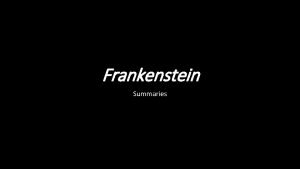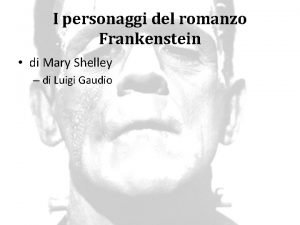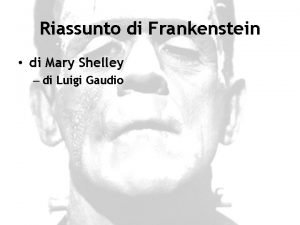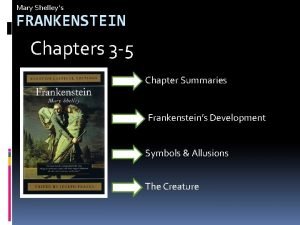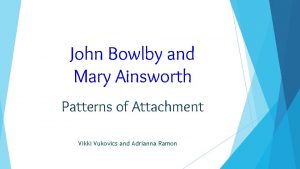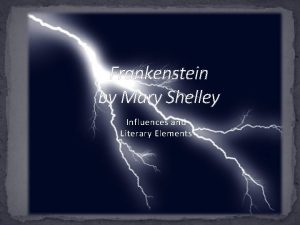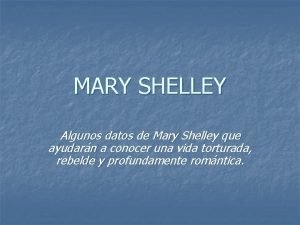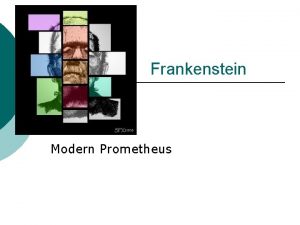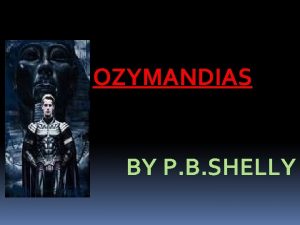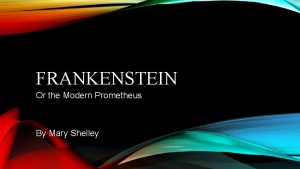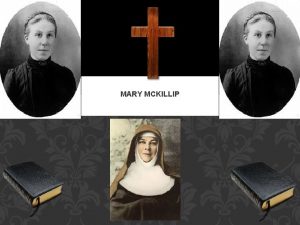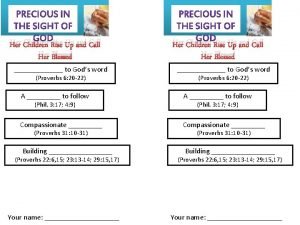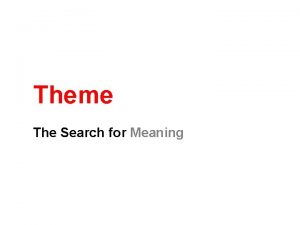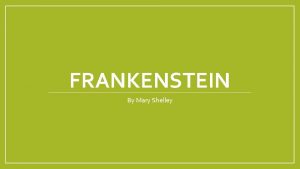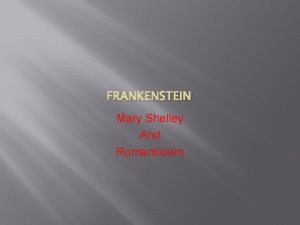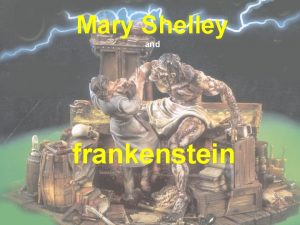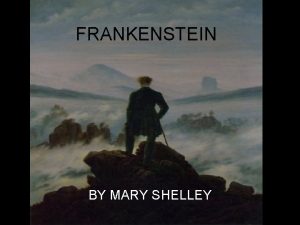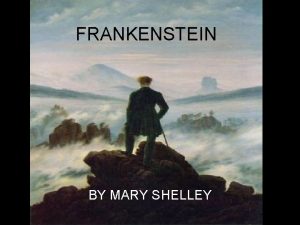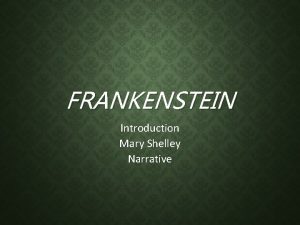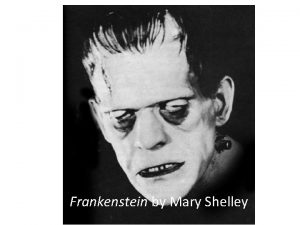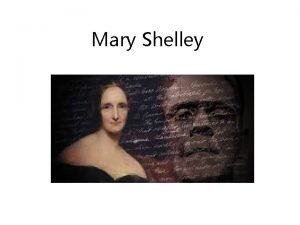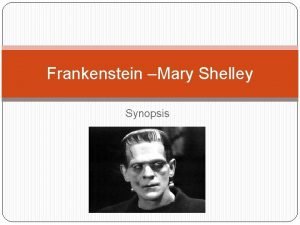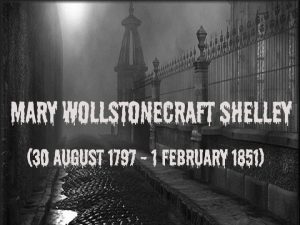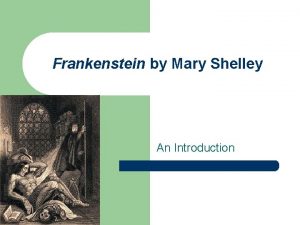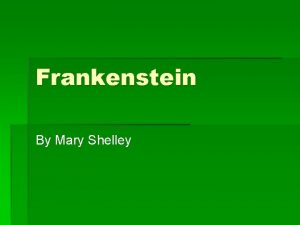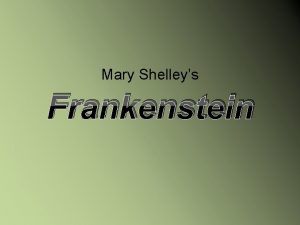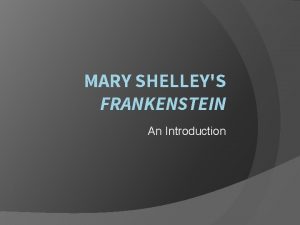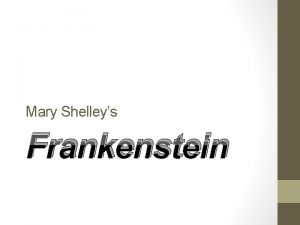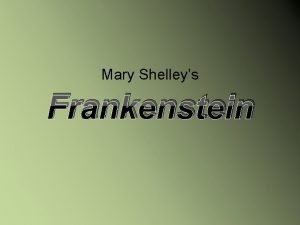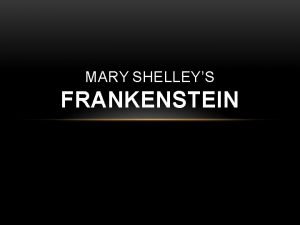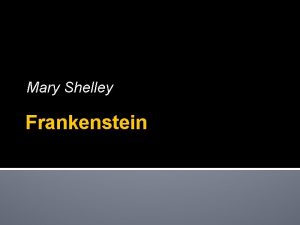Mary Shelley and Frankenstein I Her Life A





















- Slides: 21

Mary Shelley and Frankenstein

I. Her Life A. Mary Wollstonecraft

B. William Godwin

C. Percy Shelley

II. Her Inspirations and Influences A. Percy Shelley B. Lord Byron

C. Dr. Erasmus Darwin, Blundell, Galvini and science • Scientists and physicians of her time, tantalized by the elusive boundary between life and death, probed it through experiments with lower organisms, human anatomical studies, attempts to resuscitate drowning victims, and experiments using electricity to restore life to the recently dead.

D. Scotland

E. Ghost Stories F. Her Imagination and Dreams

When I placed my head upon my pillow, I did not sleep, nor could I be said to think. . I saw-with shut eyes, but acute mental vision--I saw the pale student of unhallowed arts kneeling beside thing he had put together. I saw the hideous phantasm of a man stretched out, and then, on the working of some powerful engine, show signs of life, and stir with an uneasy, half-vital motion. Frightful must it be; for supremely frightful would be the effect of any human endeavor to mock the stupendous Creator of the world. – Mary Shelley, from her introduction to the third edition of Frankenstein

III. Her Creation A. The Voyager and Scientist B. The Birth C. The Monsters

IV. Her Motifs A. Gothic 1. Supernatural horrors 2. Atmosphere of unknown 3. Emotions: anger, surprise, terror 4. Words: fear, mystery, suspense, apparition, ghost, haunted, fright, etc.

B. Romantic Elements: genre of lit. 1. Emotional Concerns a. The heart b. Nature c. Society d. Independence e. Self-reliance

• • Style: The story is generally categorized as a Gothic/Romantic novel. gloomy settings atmosphere of mystery and terror Appreciation of nature and landscapes Drive and ambition fuel Romantic characters

Psychological Realism: Isn’t merely a Gothic novel. • • Shelley adds to the development of the plot using psychological realism. She delves into the psyches of the characters in an attempt to explain WHY they react as they do: what drives them to make their decisions?

Literary Elements: Irony • • Two major ironies in the novel The Creature is more sympathetic than Frankenstein – more imaginative – more responsive to fellow creatures. • He has many pleasing qualities but is not physically attractive (which makes him an outcast).

Antithesis • Antithesis-Contrast of ideas expressed within a statement or sentence. Indicates a contrast of character, ideas, themes, settings, or moods. – – – Various contrasts permeate in the novel: the antithetical nature of Frankenstein and his creation. The opposition of life and death. Passion vs. Reason Natural vs. Unnatural Known/Unknown Civilized/Savage Masculine/Feminine Beautiful/Ugly Good/Evil Light/Dark Heat/Cold

Allusions • Allusion: Reference to another work of art. – Rime of the Ancient Mariner- Coleridge’s poem – Paradise Lost –Milton (Frankenstein can be compared with Adam, Satan, and Eve.

Themes • Themes: Recurring ideas throughout the novel. – The story’s subtitle The Modern Prometheus suggests its principal theme: Promethean ambition. In Greek mythology, Prometheus broke into Olympus, stole fire from the gods, gave it to mankind and was punished for his arrogance. Is left chained to a rock while vultures peck and tear out his organs. This cycle recurs daily.

Themes Cont’d – the consequences of irresponsibility in the pursuit of knowledge. – Warns of the pride that can accompany the acquisition of knowledge. – the consequences of society’s rejection of someone who is unattractive. – the destructive power of revenge – the conflict between a parent and child – sympathy •

Symbols: Objects/ideas made to represent something in literature. – The color white or a brilliant light. – – The Alps (Mont Blanc) – – – the sublime, the majestic aspect of nature that inspires awe and terror. Water: Knowledge, communication, tranquility, and immortal life. Becomes a symbol for danger when it becomes ice. Lightning – – symbolizes knowledge, pain, loneliness, and death. Great illusive power. Electricity replaces Promethean fire as a gift with both beneficial and destructive consequences. Fire – revenge, fear and terror

Foil • Foil: A useful and interesting contrast between two characters within a literary work. • 1. Frankenstein vs. The Creature • 2. Walton vs. Frankenstein • 3. Henry vs. Frankenstein
 Frankenstein mary shelley summary
Frankenstein mary shelley summary Frankenstein mary shelley chapter summaries
Frankenstein mary shelley chapter summaries Mary shelley frankenstein biography
Mary shelley frankenstein biography Frankenstein ch 18 summary
Frankenstein ch 18 summary Frankenstein plot
Frankenstein plot Letter 1 summary frankenstein
Letter 1 summary frankenstein Robert walton frankenstein
Robert walton frankenstein Frankenstein riassunto capitoli
Frankenstein riassunto capitoli Mary shelley frankenstein chapter summaries
Mary shelley frankenstein chapter summaries Ainsworth's strange situation
Ainsworth's strange situation Literary elements in frankenstein
Literary elements in frankenstein Mary shelley timeline
Mary shelley timeline Mary shelley presentation
Mary shelley presentation Mary shelley
Mary shelley Mary shelley born
Mary shelley born P b shelly
P b shelly Frankenstein setting time and place
Frankenstein setting time and place Mary and her family
Mary and her family Mary wollstonecraft mary a fiction
Mary wollstonecraft mary a fiction Ode on a grecian urn quiz
Ode on a grecian urn quiz Her children rise and call her blessed
Her children rise and call her blessed Theme in story meaning
Theme in story meaning



